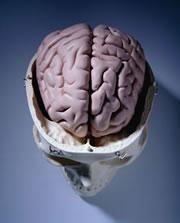 Grey matter has been linked to intelligence.Getty
Grey matter has been linked to intelligence.GettyGrey matter in the brains of people with bipolar disorder is destroyed with each manic or depressive episode.
This was the finding of an MRI study of 21 patients with bipolar disorder, a mental illness marked by successive episodes of mania followed by deep depression. The patients' brains were scanned at either end of a four-year period, during which time each patient had at least one episode and some as many as six. In all cases, the amount of grey matter in the temporal lobe and the cerebellum decreased compared to the grey matter in control subjects. These areas of the brain are associated with memory and coordination.
Patients that had suffered more episodes over the four years had the most marked difference in the amount of grey matter that had disappeared. "It was significantly correlated to the number of episodes," says Andrew McIntosh, from the University of Edinburgh, and lead author of the paper out today in the Journal of Biological Psychiatry1.
Everyone loses brain tissue over time, but the process seems to be accelerated in people with some mental conditions, including schizophrenia and Alzheimer's disease. Now bipolar disorder joins this list.
Scientists already had a hunch that bipolar disorder was related to a loss of grey matter, says Lars Kessing at the University of Copenhagen — this is the first evidence to prove them right.
Language skills
When McIntosh compared the loss of grey matter with the patients' verbal IQ scores at the beginning and end of the study, he noticed a trend between the two; as grey matter was destroyed the ability of the patients to describe words and perform other language-association tasks declined. McIntosh adds that the effect wasn't enough to be statistically significant — possibly because the sample size of 21 was too small.
Grey matter has been previously linked to intelligence (see 'Grey matter matters for intellect').
McIntosh also looked to see if the effect had anything to do with medication — bipolar patients are often prescribed lithium, antidepressants or antipsychotics. "Medication didn't appear to be interfering," he says, but adds that it would going too far to say that medication couldn't affect the deterioration of the brain. For example, medication could be used to limit the number of manic/depressive episodes, which he says now appears to be an important factor in the extent of damage seen in the brain.
"This suggests that we have to be more eager at trying to prevent manic and depressive episodes," agrees Kessing.
ADVERTISEMENT
McIntosh's team are now looking more closely at factors that might contribute to the grey-matter loss. These could be related to stress hormones, he says, or could be genetic.
Researchers note that simply being grumpy or excited from time to time is not likely to destroy your brain. "It's not if you just feel moody," explains Kessing, "this patient population has quite severe bipolar disorder."
Visit our moodswingscandestroy.html">newsblog to read and post comments about this story.
